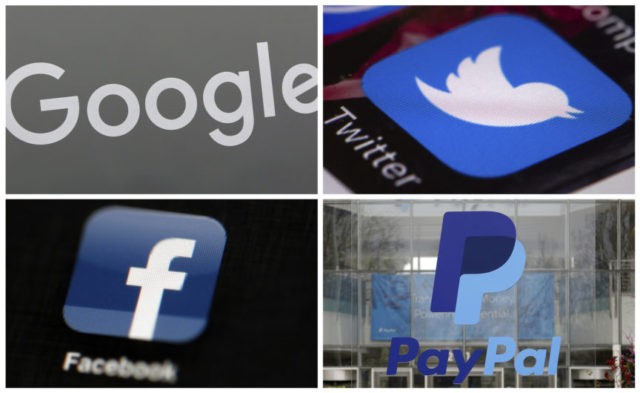The thing that puts me off libertarianism is the “more libertarian than thou” game so many libertarians like to play.
“What? You mean you don’t believe that enterprising heroin dealers should be free to ply their wares in kindergartens so as to catch ’em while they’re young? You’re not a real libertarian. You’re a fascist control freak…”
All right, I exaggerate. But the latest libertarian test is very real – and is the subject of a big falling out between two National Review writers Victor Davis Hanson and Kevin Williamson.
See where you stand.
a) Facebook, Google, Twitter etc are the equivalent of 19th Century robber baron monopolies ripe for breaking up under Anti-Trust regulation because of their overmighty power and their iniquitous war on free speech and their outrageous bias against conservatives.
b) What are you saying, man? Don’t you see, this is, like, a violation of everything we libertarians believe in? You can’t – Pass me that joint, will you? You’re bogarting it. Yes you are – where was I? Oh yeah, look, it’s like this: if you’re gonna complain about Christian bakeries being prosecuted for refusing to bake gay cakes because of they violate their religious principles, you’re just being hypocritical complaining when YouTube puts restrictions on PragerU videos because they violate their liberal principles. Either you believe in free markets or you don’t.
If you’re a) you’re with Victor Davis Hanson who outlines his case here.
If you’re b) you’re with Kevin Williamson, who has now unfathomably accepted the King’s Shilling to take on the job of house libertarian at that famous bastion of free speech, liberty and alternative viewpoints The Atlantic.
I’m with Victor Davis Hanson. And like Hanson, I resent deeply Williamson’s sly implication that if you believe in state regulation for the internet you’re really no better than all the worst progressive big government control freaks.
This argument is playing into the hands of the enemy, for there is nothing that makes liberals bigger in their underpants than using free market philosophy as a stick with which to beat their right-wing enemies.
But as that first great champion of free markets Adam Smith recognized in his Wealth of Nations – published 1776, so this knowledge has been out there for as long as the U.S. has existed – for capitalism to function properly there must be a degree of regulation: not because government intervention is necessarily ideal but because without it the market cannot function effectively.
Smith was thinking specifically of monopolies and cartels which he considered a conspiracy against the public.
It seems to me a perfectly tenable position to believe that Christian bakeries should be free not to bake – say – gay marriage cakes because they do not hold a monopoly market position. Anyone can set up a bakery, with minimal effort. There are minimal barriers to entry. How difficult can it be to bake a cake, shove some pink icing on top, then add two male figurines holding hands? Even I could do that if you rang me up and gave me reasonable notice.
The big tech problem is entirely different, as Ann Coulter noted with her usual forthright clarity at Breitbart News‘s New Orleans Town Hall.
It is, as she says, “real and terrifying”. It’s happening now and needs addressing now, while we still have a chance. There’s not some wonderful, free market, magic bullet solution just around the corner whereby all we have to do is get on Gab and hang out talking to ourselves until some sympathetic figure like Peter Thiel comes along and rescues the internet from the bad guys…
As Paul Joseph Watson says here:
“Facebook, Twitter and Google have established a virtual monopoly on social media. In terms of online expression, these outlets are the de facto Internet. Restricting people’s access to these platforms based on their political beliefs is a human rights issue. Just as the phone company should not be able to disconnect you because of the content of your conversations, people should not be banned for their ideology, except in extreme circumstances when laws are being broken.
We need to rally lawmakers to make holding big tech accountable one of their top priorities. We need to demand Google, Facebook and Twitter adhere to Section 230 of the Communications Decency Act, which dictates they remain non-partisan, or face losing their legal immunity for user content. We need transparency, we need an amnesty on all those who have been unfairly banned by big tech. This is one of the defining issues of our generation and we cannot afford to lose this battle.”
If we didn’t haven’t President Trump in the White House, we would have lost it already.

COMMENTS
Please let us know if you're having issues with commenting.